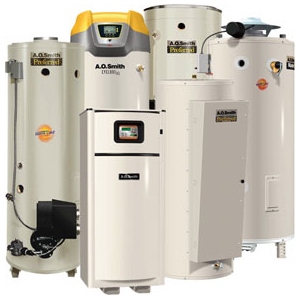Is it Time For Water Heater Repair or Replacement?
 When we least expect it, a water heater will fail. Instead of clear, hot water, you'll have rusty, lukewarm or cold water or even worse, no water at all. It happens to the best of us.
When we least expect it, a water heater will fail. Instead of clear, hot water, you'll have rusty, lukewarm or cold water or even worse, no water at all. It happens to the best of us.
It is the experience of our Plano water heater repair service that conventional water heaters last about 11 years. Tankless water heaters that make hot water on demand, usually last between 15 - 20 years. Routine maintenance can prolong a water heater's life span, but when a water heater presents failure symptoms, it's time to troubleshoot and take action.
 Here's a simple guide to use for reference, but remember our team of Plano plumbers is just a phone call away. We may even save you time and money since our expert plumbers can quickly diagnose, recommend and repair the source of the problem with knowledge, experience and available needed tools.
Here's a simple guide to use for reference, but remember our team of Plano plumbers is just a phone call away. We may even save you time and money since our expert plumbers can quickly diagnose, recommend and repair the source of the problem with knowledge, experience and available needed tools.
Most common water heater symptoms - and parts or services needed
 Inadequate amount of hot water or cold water? If water is warm, but not hot, the water heater may have a broken thermocouple that needs replacing, or a gas pilot. If it is cold, the hot and cold water are likely mixing in the tank. A dip tube is probably the needed part. If the problem persists after dip tube replacement, this signals that a cross connection may have taken place due to a faulty plumbing installation error since water heaters are usually on the same water line as other appliances in the home. To check for this possibility, shut off the water heater's water supply and open a hot water tap faucet. A cold-water connection crossing the hot water line has taken place if any water comes out. If so, then faulty plumbing installation is the problem.
Inadequate amount of hot water or cold water? If water is warm, but not hot, the water heater may have a broken thermocouple that needs replacing, or a gas pilot. If it is cold, the hot and cold water are likely mixing in the tank. A dip tube is probably the needed part. If the problem persists after dip tube replacement, this signals that a cross connection may have taken place due to a faulty plumbing installation error since water heaters are usually on the same water line as other appliances in the home. To check for this possibility, shut off the water heater's water supply and open a hot water tap faucet. A cold-water connection crossing the hot water line has taken place if any water comes out. If so, then faulty plumbing installation is the problem.
 Rotten-egg smell or rust-colored water? The water tank lining begins to decay when it's time to replace the sacrificial anode rod due to overflowing erosion build up.
Rotten-egg smell or rust-colored water? The water tank lining begins to decay when it's time to replace the sacrificial anode rod due to overflowing erosion build up.
As the tank decays, rust-colored water or a rotten-egg smell signals the need for the rod replacement.
Rust colored water may also be a sign of chemical leeching in your pipes. Hot water can eventually leech chemicals from galvanized iron pipes or cast iron pipes, which will discolor your water, change the taste of your hot water, and put hazardous heavy metals in your drinking water. This will require a re-pipe.
 Loud whining or rumbling, popping noise may mean that it's time for your tank to be flushed.
Loud whining or rumbling, popping noise may mean that it's time for your tank to be flushed.
Sediment builds up in water heaters causing noises, leaks and odors as the mechanisms that drive your water heater get caught on mineral deposits, like calcium.
The best way to combat this after the fact is with a thorough pipe flushing. You can also largely prevent this problem if you use a water filtration or water purification system, which will also greatly improve the taste and purity of your drinking water. If your noisy water heater has become a reoccurring problem, this may be a suitable permanent solution.